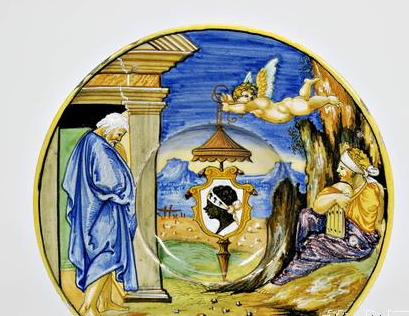The cruelty of love is a common theme
愛情中的殘忍是一個常見的主題
I showed at the beginning of my talk a Faenza dish of a woman
在我剛開始講一個有關一個女子用匕首
about to pierce her lovers heart with a dagger
刺穿她情人心臟的法恩扎瓷盤
This dish in the V and A
在維艾博物館中的這個瓷盤
was painted much earlier in Deruta
是更為早期的時候在德魯特進行彩繪的
around 1470-90
大概出產于1470到1490年間

At the centre
在瓷盤的中央
framed by gothic foliage
被哥特式樹葉包圍著的
is a young woman in court dress
是一個身穿宮廷禮服的年輕女子
she draws her bow to aim an arrow at a young man
她拉起他的弓箭
bound naked to a column
對準一個赤裸著綁在石柱上的年輕男子
This figure is copied from an earlier type of engraving
這個人物是模仿一種早期的版畫而來的
illustrating Petrarch's triumph for fame
描繪的是彼特拉克功成名就的畫面
while the float upon which they stand
他們站著的彩車
recalls the imagery of Petrarch's triumphs
讓人想起了彼特拉克勝利的畫面
which was closely associated with wedding feasts
這個和婚宴以及意大利文藝復興時期的
and spectacle in Renaissance Italy
熱鬧場面息息相關
The two figures flank a standing cup
這兩個人物旁邊立著一個高腳杯
"which is a heart and pierced by two arrows
里面是一顆被兩支箭刺穿的心臟
inscribed by in a scroll
年輕男子的頭周圍飛舞著一個卷軸
that flutters around the young man's
上面的題字是
head it says "oh what a cruel fate"
"噢 命運多么殘酷"
The way in which the young woman
而年輕女子則被描繪成一名弓箭手
is portrayed as an archer as she unleashes arrows into
正放箭刺穿她深愛之人的心臟
the heart of her beloved inflicting pain and inflaming desire
所帶來的痛苦和激起的欲望
is a literary conceit
是一種文學構想
The theme is elaborated on a second dish from Deruta
這個主題在德魯特的第二只瓷盤
also in the V and A
得到了細致的體現 同在維艾博物館
here a woman wears court dress of the late 15th century
這里 一名女子穿著15世紀末的宮廷禮服
she holds a trophy, a cup containing a heart
她手持著戰利品 也就是盛放著被兩支箭
pierced by two arrows surmounted by a crown
刺穿心臟的杯子 上面還放著一個皇冠
She is accompanied by an inscription
她的旁邊有一行文字
"my heart is wounded by you"
"我的心被你傷害過"
the words are intended to be those of the male lover
這些字眼應該是男方所說的
whose heart has been pierced by the woman's glances
他的心臟被女子猶如利箭般的
as if by arrows
眼神所戳傷
He dresses his lady as presented on the dish
瓷盤上描繪的是他為他的妻子更衣
The idea that the woman's gaze wounds the heart of the lover
這個女子的眼神灼傷愛人心臟的構想
has a very long history
早就有了
In the Biblical Song of Songs, the poet dresses his lover
在《圣經雅歌》中,詩人為其愛人更衣
"thou hast ravished my heart my spouse
"你讓我著迷 我的愛人
thou hast ravished mine heart with one of thine eyes"
你用一只眼睛就可以迷惑我"
The conceit expressed here is a literary one
這里所表達的這種構想是一種文學構想
echoing late medieval love poetry in the vernacular
和中世紀用方言寫成的情詩相互呼應
such as the poem by Dante Allegory
如阿利蓋利·但丁的詩歌
in which the poet promises
詩人發誓要為自己報仇
to avenge himself on the stony heart of the woman
報復那個用眼神刺穿其心臟的
who has pierced him to the heart with her glance
鐵石心腸的女人
He writes "to such a woman
他這樣寫道 "對于這樣的女人
my song goes straight to her who wounded me
我的歌直接獻給那個傷害我
and still conceals what I most hunger for her heart
但仍隱藏了我最渴望得到她的心的心情
with a fast arrow cleave
最終他的心被箭深深刺穿"
for in revenge, great honour we achieve"
在復仇中 我們獲得了莫大的榮譽











